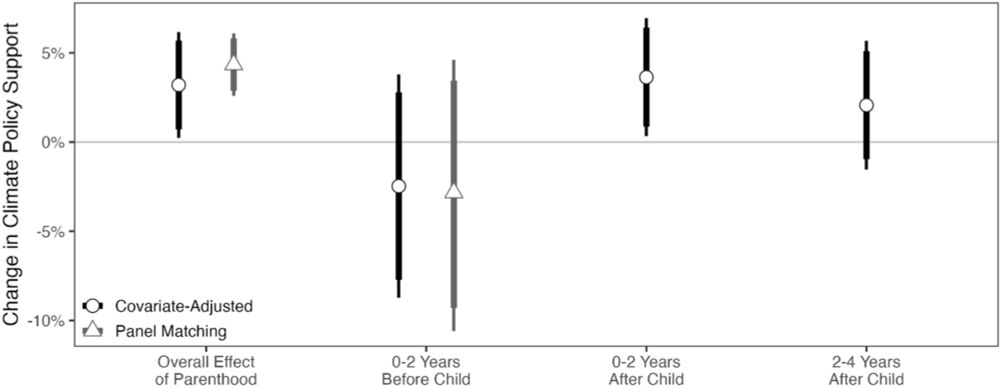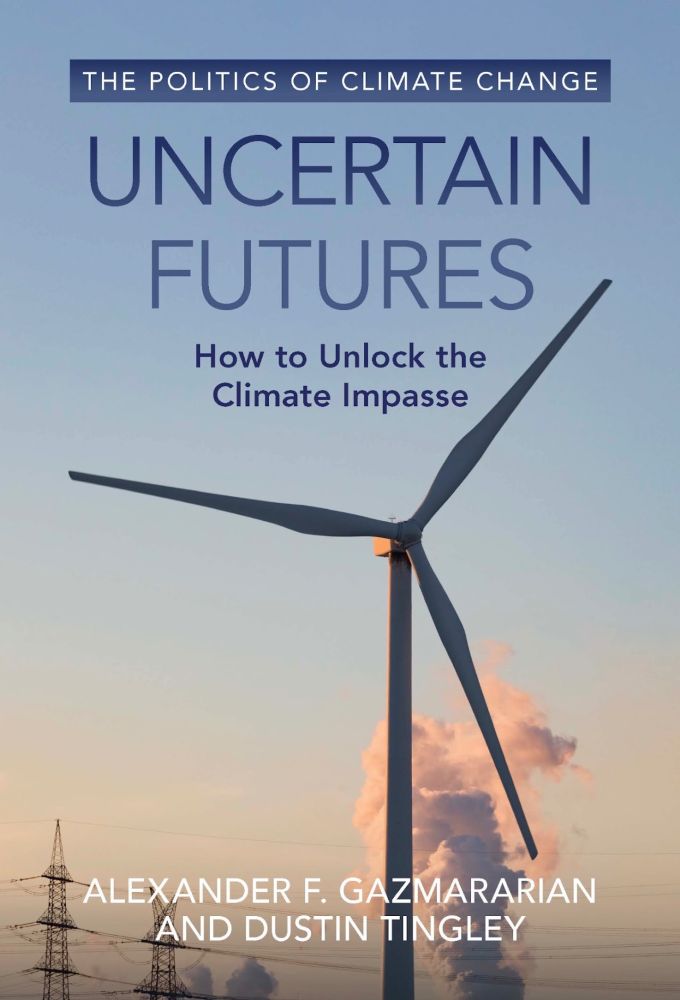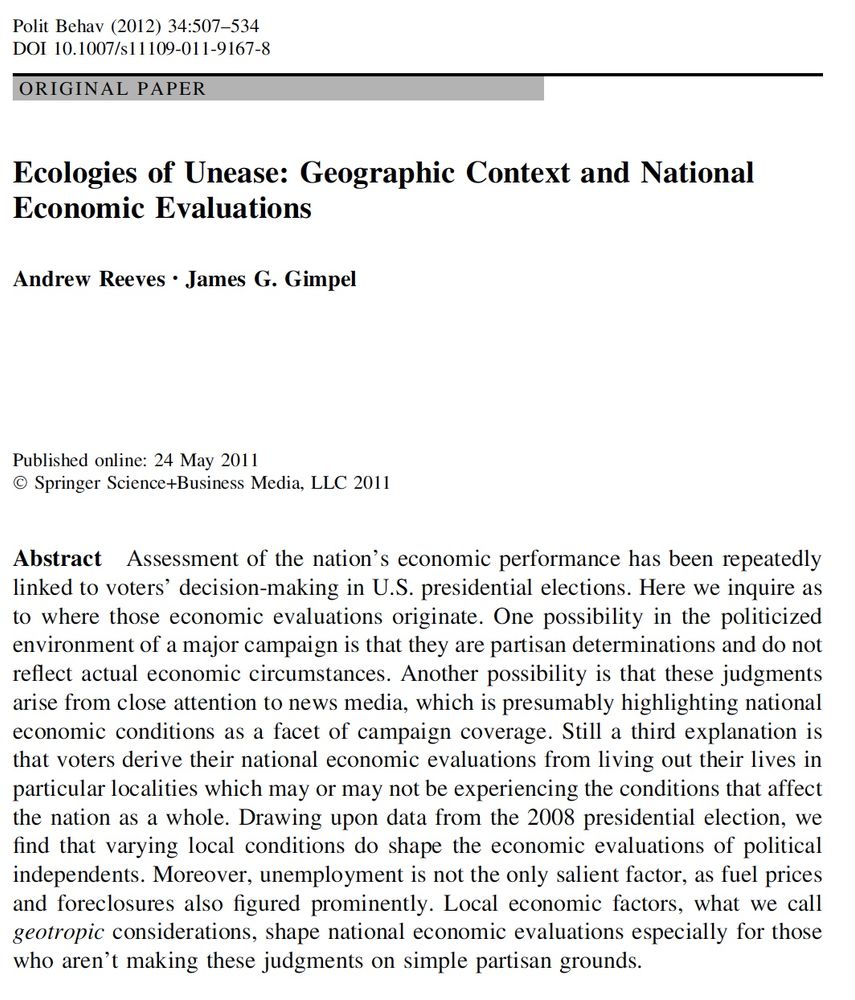
Alexander F. Gazmararian
@agazmararian.bsky.social
Social scientist studying political economy, behavior, and climate change. Prof @ University of Michigan
Research: www.alexgaz.org
Book: https://uncertainfuturesbook.com
Research: www.alexgaz.org
Book: https://uncertainfuturesbook.com
I also recommend the Climate Solutions Lab’s excellent Syllabus Bank for climate politics & policy teaching resources: climate.watson.brown.edu/syllabus-bank
Syllabus Bank
climate.watson.brown.edu
August 16, 2025 at 6:26 PM
I also recommend the Climate Solutions Lab’s excellent Syllabus Bank for climate politics & policy teaching resources: climate.watson.brown.edu/syllabus-bank
This article combines panel data + DiD + experiments to provide new causal evidence on how life experiences shape time horizons and climate policy support.
You can read it here (open access): link.springer.com/article/10.1...
You can read it here (open access): link.springer.com/article/10.1...

Valuing the Future: Changing Time Horizons and Policy Preferences - Political Behavior
The short time horizons of citizens are a prominent explanation for why governments fail to tackle significant long-term public policy problems. Evidence for the influence of time horizons is mixed, c...
link.springer.com
July 26, 2025 at 7:20 PM
This article combines panel data + DiD + experiments to provide new causal evidence on how life experiences shape time horizons and climate policy support.
You can read it here (open access): link.springer.com/article/10.1...
You can read it here (open access): link.springer.com/article/10.1...
I ran falsification tests to rule out alternative explanations (i.e., risk preferences, altruism).
Then I conducted two experiments: prompting people to think about their kids increased their future focus, which in turn boosted support for climate policy.
Then I conducted two experiments: prompting people to think about their kids increased their future focus, which in turn boosted support for climate policy.
July 26, 2025 at 7:20 PM
I ran falsification tests to rule out alternative explanations (i.e., risk preferences, altruism).
Then I conducted two experiments: prompting people to think about their kids increased their future focus, which in turn boosted support for climate policy.
Then I conducted two experiments: prompting people to think about their kids increased their future focus, which in turn boosted support for climate policy.
I analyze a 9,500-person panel surveyed 3 times over 6 years.
With a difference-in-differences + panel matching approach, I find:
→ New parents become more supportive of climate policy than their otherwise similar peers.
With a difference-in-differences + panel matching approach, I find:
→ New parents become more supportive of climate policy than their otherwise similar peers.
July 26, 2025 at 7:20 PM
I analyze a 9,500-person panel surveyed 3 times over 6 years.
With a difference-in-differences + panel matching approach, I find:
→ New parents become more supportive of climate policy than their otherwise similar peers.
With a difference-in-differences + panel matching approach, I find:
→ New parents become more supportive of climate policy than their otherwise similar peers.
It’s challenging to study how time horizons affect policy views because how much we value the future isn’t randomly assigned.
I approach this issue by leveraging a personal life event that plausibly shifts future focus: becoming a parent.
I approach this issue by leveraging a personal life event that plausibly shifts future focus: becoming a parent.
July 26, 2025 at 7:20 PM
It’s challenging to study how time horizons affect policy views because how much we value the future isn’t randomly assigned.
I approach this issue by leveraging a personal life event that plausibly shifts future focus: becoming a parent.
I approach this issue by leveraging a personal life event that plausibly shifts future focus: becoming a parent.
This paper uses experimental data to test mechanisms behind an observational finding: link.springer.com/article/10.1...

Valuing the Future: Changing Time Horizons and Policy Preferences - Political Behavior
The short time horizons of citizens are a prominent explanation for why governments fail to tackle significant long-term public policy problems. Evidence for the influence of time horizons is mixed, c...
link.springer.com
July 23, 2025 at 2:31 PM
This paper uses experimental data to test mechanisms behind an observational finding: link.springer.com/article/10.1...
Uncertain Futures, written as the IRA was finalized, cautioned about the risks of policy reversal as the political pendulum swings
uncertainfuturesbook.com
uncertainfuturesbook.com

Home
Order Now: Amazon, Barnes & Noble (Print/eBook); Cambridge University Press (PDF)
Political scientists Alexander F. Gazmararian at Princeton and Dustin Tingley at Harvard have a pathbreaking new book...
uncertainfuturesbook.com
May 23, 2025 at 11:57 AM
Uncertain Futures, written as the IRA was finalized, cautioned about the risks of policy reversal as the political pendulum swings
uncertainfuturesbook.com
uncertainfuturesbook.com
Great paper on this:

November 26, 2024 at 8:58 PM
Great paper on this:

